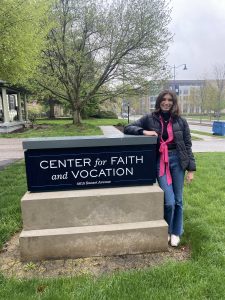Faith as Personal Experience
 By Jenna Burd, ‘26
By Jenna Burd, ‘26
One weekend in third grade my childhood best friend and I had a sleepover. It was cute and fun, we ate cookies and candy until our stomachs hurt and gossiped about boys until the wee hours of the morning. However, when that morning rolled around, it was time to go to her Lutheran church. My parents are an interfaith couple. My dad is Jewish, my mom is non-denominational Christian. I grew up attending back-to-back Hanukkah and Christmas services, lighting the menorah, and going on Easter egg hunts. Let’s just say I got the best of both worlds as a kid. The thing I admire most about my parents is they exposed me equally to both religions and allowed me to choose my religion when I was ready. But I was still in the process of figuring out what religion I wanted to follow in third grade, and going to an unfamiliar church scared the heck out of me. I squirmed in the wooden pews for hours listening to strangers chanting hymns I didn’t understand. The plain truth was that third grade me was very uncomfortable with people who were different from me.
Fast forward ten years later, I am attending Cru worship night one day and a Diwali celebration the next. From my experiences with being a CFV scholar and an intern, I’ve grown in empathy and broken down cultural barriers. After all, we’re all human at the end of the day. I support any ideology that believes in something bigger than oneself. I believe in fostering hope.
My favorite internship project this year was pioneering Breakfast, Books and Big Ideas: An Interfaith Book Club. We had a solid group of five members attend five sessions over the fall semester and asked them to read a section from Life of Pi for discussion over Starbucks. We discussed everything from how faith relates to suffering all the way to favorite restaurants in Broad Ripple. I really enjoyed getting close with this tight-knit group this semester and I’m looking forward to another one!
Spiritual studies should be a process of self-exploration. Your choice to identify with a faith or be agnostic should be based on personal experiences that have shaped you throughout life. “Everyone ought to challenge the things they’ve been told; your faith ought to be personal to you, church or not. If it’s not, then how can you have true faith?” After all, what’s the point of having faith if you’re not bought in. Faith fluidity is vital to protecting the youth from close-mindedness which evolves into discrimination and strong hatred. That being said, I am extremely grateful for the opportunity to intern for the CFV and broaden my horizons. This experience has truly transformed me from that scared little girl in a Lutheran Church to a confident, empathetic human being.